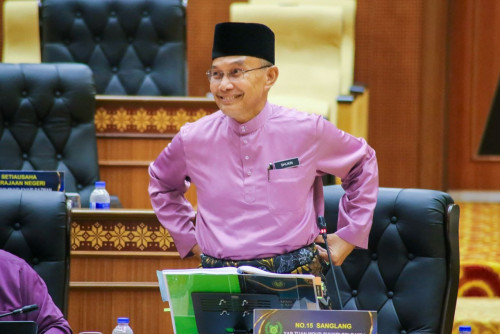KUALA LUMPUR – Budget 2024 has several goodies to address an ongoing problem Malaysia has been grappling with – how to prevent women from dropping out and encourage them to stay in or return to the workforce.
Building on previous years’ initiatives to break out of the stalemate and reach the target of 60% female labour participation rate (FLPR), Budget 2024 is extending tax incentives for women returning to work – TalentCorp’s Career Comeback Tax Exemption programme – till December 31, 2027.
Prime Minister Datuk Seri Anwar Ibrahim also proposed that the income tax exemption limit on childcare allowances received by employees or paid directly by employers to childcare centres be increased from RM2,400 to RM3,000.
The incentives come at a time when women have not been able to return to the workforce as well as men after Covid-19 upended things.
This is despite women comprising 61 per cent of university graduates but form about a third of workers. Women’s labour participation rate only returned to pre-Covid levels of 55.6% in 2022, according to the Department of Statistics Malaysia (DoSM).
Experts said the initiatives were a good jumping off point, but added they were disappointed the 2024 Budget incentives have fallen short of their expectations.
“The intention is good. You also want to encourage and make it easier to provide more support for women to go back to work. But the budget being given or allocated falls short,” said Lai Suat Yan, senior lecturer with the gender studies programme at University of Malaya.
Economist Datuk Madeline Berma agreed, saying the incentives were not what many women were expecting and did not go deep enough to address the problems women face.
She said the incentives had been tried before, with mixed results, as some employers balked at putting in childcare facilities in buildings despite the government offering tax incentives.
“Anything to do with women and family, it is seen more as a cost (by employers) rather than an investment,” she said, adding the government should consider penalising employers if they do not provide childcare facilities.
On top of current incentives in the 2024 Budget, Berma and others said they would have liked to see the budget address the formation of a care economy in Malaysia, which would go a long way to address the reasons why women drop out of the workforce in the first place.
Care work
Getting women to remain in the workforce is important for economic growth.
In a 2020 report, World Bank researchers said that closing the gender gap in labour force participation in Malaysia could increase the country’s per capita income by 26.2% — an average annual income gain of about US$2,230 (RM10,581.35) for each Malaysian.
But women tend to leave the workplace after a few years for various reasons.
According to a 2014 report by the United Nations Development Programme (UNDP) and the Ministry of Women, Family and Community Development, one of the main findings in research was that the odds of women without childcare arrangements are 94 per cent less likely to remain in the workforce compared to women with childcare arrangements.
And while childcare issues remain the main reason why women drop out of the workforce, it is not the only reason. Women also leave the workforce because they have to take care of other family members.
“For women to go back to work, one of the biggest impediments or barriers is actually the care work that they do. But other than children, as Malaysia is heading towards an ageing nation – the care of the elderly, on whose shoulder does the care fall on?” said Lai, adding women were also expected to help care for disabled family members.
An estimated six million or so of the population will be 65 and older by 2040.
According to the Khazanah Research Institute’s pilot Time Use study conducted in 2018, Malaysian women spent 63.6% more time on average for unpaid care work, with women spending an average 3.6 hours (15.2%) of their time compared with 2.2 hours for men (9.3%).
Rather than having to juggle the demands of work and household duties, many women opt to leave their jobs to take care of their families. So the focus should not just be on providing childcare assistance but also eldercare and others.
“For this to work, a care infrastructure needs to be there,” said Lai.
Care economy includes building care facilities, private and public, and recognising and training workers to provide care services.
The UNDP and other organisations have been encouraging Malaysia to consider developing a care economy as the country heads towards an ageing nation.
One of them is the Asia Foundation. Senior Policy Advisor Ahmad Ikram Abdullah said there was a huge demand for professional and standardised care work, which will only grow as the Malaysian population ages.
“(Care economy provides) a solution to the need of care workers but look at it also as potential economic growth in the country where there is potential to provide jobs and services,” he said.
He expected the private sector to be the primary driver in developing the care economy.
Universiti Sains Malaysia senior lecturer Zaireeni Azmi said professionalising care work will bring accountability to a generally unregulated industry and be a boon to the economy with wages commensurating with the workers’ qualifications.
“If you professionalise the care economy, then the wages will not be low. Right now, the wages are low because of the unlicensed and untrained workers,” she said.
The care economy will also provide more economic opportunities for women.
Experts agreed that the government needs to support the development of the care economy, by getting data, establishing policies and creating a framework for it.
The government should also offer incentives to the private sector to develop it.
What care economy is present in Malaysia currently is decentralised with no standardisation, as licensing and regulations fall under various local ordinances.
Many unlicensed facilities are operational. There are no standardised qualifications required for caregiving work.
A formal care economy will take time to develop should Malaysia decide to take the step.
In the meantime, experts suggest making sure the incentives do not go to waste as people tend to be unaware of assistance available to them.
Zaireeni, who is with USM Centre for Research on Women and Gender, said the incentives were nevertheless a good initiative, adding the focus should now be on reaching women who need them.
“It’s a problem with the government programmes. The information is not trickling down to the masses. The ones who know only know because they follow the tabling of the budget,” she said.
She also called on the government to track and make public how the incentives are being utilised. – Bernama, October 19, 2023




_and_Mariammah_Krishnan_(right._back-row__far_left).png)




















